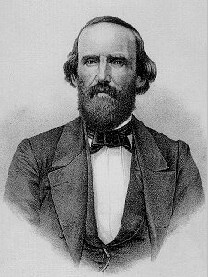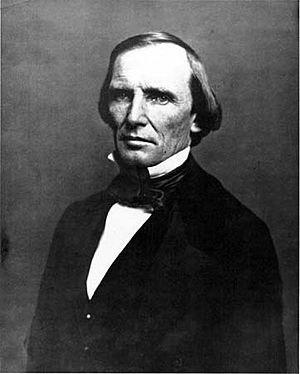Benjamin McCulloch facts for kids
Quick facts for kids
Benjamin McCulloch
|
|
|---|---|

Benjamin McCulloch
|
|
| Born | November 11, 1811 Rutherford County, Tennessee |
| Died | March 7, 1862 (aged 50) Benton County, Arkansas |
| Place of burial |
State Cemetery in Austin, Texas
|
| Allegiance | |
| Service/ |
|
| Years of service | 1835–1836; 1840–1845 (Texas Army) 1846–1847 (Texas Militia) 1861–1862 (CSA) |
| Rank | |
| Battles/wars | Texas Revolution Mexican–American War American Civil War |
Benjamin McCulloch (born November 11, 1811 – died March 7, 1862) was a brave soldier and leader. He played important roles in the Texas Revolution, the Mexican–American War, and the American Civil War. He was also a Texas Ranger, a sheriff, and a U.S. marshal. Later, he became a brigadier general in the Confederate army.
Contents
Early Life and Adventures
Benjamin McCulloch was born in Rutherford County, Tennessee, on November 11, 1811. He was one of twelve children. His family moved often, living in different parts of Tennessee and Alabama. They finally settled near Dyersburg. A famous neighbor there was Davy Crockett, who became a big influence on young Ben.
In 1834, Ben decided to head west for adventure. He tried to join fur trappers and freight companies, but it didn't work out. He even looked into lead-mining in Wisconsin. In the fall of 1835, he returned home to try farming.
Texas: A New Beginning
When Davy Crockett went to Texas in 1835, Ben McCulloch decided to go with him. Ben was tired of farming and wanted excitement. He and his brother, Henry, planned to meet Crockett's group in Nacogdoches.
However, Ben got sick with measles and couldn't travel for several weeks. This meant he missed the famous Battle of the Alamo. Crockett and his men fought there, but the Alamo fell.
Fighting for Texas Freedom
After recovering, McCulloch joined the Texas army under General Sam Houston. He fought bravely at the Battle of San Jacinto on April 21, 1836. He commanded one of the "Twin Sisters" cannons. These cannons were a gift to the Texans from the people of Cincinnati, Ohio. His cannon helped greatly against the Mexican army. For his courage, he was promoted to first lieutenant.
After the revolution, McCulloch returned to Tennessee to recruit more volunteers for Texas. He came back with 30 men, led by Robert Crockett, Davy Crockett's son.
Joining the Texas Rangers
By 1838, McCulloch became a land surveyor for the Republic of Texas. He then joined the Texas Rangers as a lieutenant under Captain John Coffee "Jack" Hays. He became known as a skilled fighter against Native American groups. He preferred using shotguns, pistols, and Bowie knives.
His fame helped him get elected to the Republic of Texas House of Representatives in 1839. During this time, he was injured in a duel, which left his right arm permanently damaged.
In 1842, McCulloch continued surveying and serving in the military. He was a scout at the Battle of Plum Creek against the Comanches. He also helped push back Mexican raiding parties that invaded San Antonio.
War with Mexico and Beyond
In 1845, Texas joined the United States. McCulloch was elected to the first Texas state legislature. When the Mexican–American War began in 1846, he quickly raised a company of Texas Rangers. These Rangers were known for their speed and endurance.
McCulloch became the chief of scouts under General Zachary Taylor. He was promoted to major. He became famous across the country for his daring missions in northern Mexico. He was fluent in Spanish and used his scouting skills to gather important information. He even got close to the Mexican general Santa Anna's tent without being caught.
His excellent scouting before the Battle of Buena Vista likely saved General Taylor's army. After this battle, he was promoted again to major of U.S. Volunteers.
Life After the War
After the war, McCulloch joined the California Gold Rush in 1849. He didn't find gold, but he was elected sheriff of Sacramento. His old commander, Jack Hays, was elected sheriff of San Francisco on the same day.
Later, McCulloch was appointed a U.S. marshal for the Eastern District of Texas in 1852. He used this time to study military science, as he had not received formal military training.
Civil War Service
When Texas left the United States on February 1, 1861, Benjamin McCulloch was ready to serve. On February 14, he received a colonel's commission from Confederate President Jefferson Davis. He was ordered to demand the surrender of all federal military posts in Texas.
On February 16, U.S. Army General Twiggs surrendered all federal property in San Antonio to McCulloch. This was done peacefully, and Twiggs's troops were allowed to leave Texas unharmed. On May 11, President Davis promoted McCulloch to brigadier general.
Leading the Army of the West
McCulloch was put in charge of the Indian Territory. He set up his headquarters in Little Rock. He began building an army called the Army of the West, with soldiers from Texas, Arkansas, and Louisiana. He also helped form alliances with Native American nations like the Cherokee and Choctaw.
On August 10, 1861, McCulloch's troops won a major victory at the Battle of Wilson's Creek in Missouri. Even though his soldiers had limited ammunition, they defeated the Union army.
Death at Pea Ridge
McCulloch commanded the right side of the Confederate army at the Battle of Pea Ridge (also known as Elkhorn Tavern) in Arkansas. On March 7, 1862, his troops successfully captured a key Union artillery position.
However, as McCulloch rode forward to scout enemy positions, he was shot and died instantly. He was known for not liking army uniforms and was wearing a black velvet civilian suit when he died. His death was a great loss for the Confederate forces.
After McCulloch's death, the Confederate forces lost their leadership and began to fall apart. Many historians believe that his death led to the Confederate defeat at Pea Ridge and the loss of Arkansas.
Legacy
Benjamin McCulloch was first buried at Pea Ridge. Later, his body was moved to the Texas State Cemetery in Austin. His papers are kept at the University of Texas at Austin.
McCulloch County, Texas, formed in 1856, was named in his honor. He is also one of thirty men in the Texas Ranger Hall of Fame in Waco.
Fort McCulloch, a Confederate fort built by Brigadier General Albert Pike, was named after him. It is located in Bryan County, Oklahoma, and is now a historic site.
Camp Ben McCulloch, established near Austin in 1896, was a reunion site for Confederate veterans. Today, it is a public recreation area.
See also
 | William M. Jackson |
 | Juan E. Gilbert |
 | Neil deGrasse Tyson |


